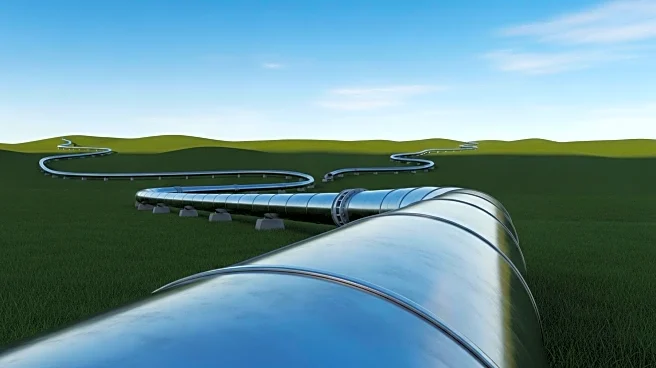What's Happening?
Summit Carbon Solutions is requesting Iowa regulators to amend its carbon dioxide pipeline permit to explore alternative sequestration sites in states such as Nebraska, Wyoming, Colorado, and Kansas. This comes as the company faces legal challenges from opponents, including landowners and environmental groups, who are contesting Summit's Iowa permit in court. The pipeline's original route is blocked by South Dakota's ban on the use of eminent domain, which complicates the plan to sequester carbon dioxide in North Dakota. Summit's attorney, Bret Dublinske, highlighted that other states are now potential options for carbon storage, as Tallgrass Energy is already capturing carbon through its Trailblazer pipeline in Nebraska and sequestering it in Wyoming. The Iowa Farm Bureau's government relations counsel, Christina Gruenhagen, expressed concerns about the pipeline's viability and the use of eminent domain in Iowa.
Why It's Important?
The amendment request by Summit Carbon Solutions is significant as it could reshape the carbon sequestration landscape in the Midwest. If successful, the pipeline could lower the carbon footprint of ethanol production in Iowa and other states, potentially qualifying the fuel for federal tax credits. This development is crucial for farmers, ethanol plants, and rural communities that rely on these markets. However, the legal challenges and the uncertainty surrounding the pipeline's route raise questions about the project's feasibility and its public purpose. The outcome of this case could set precedents for future infrastructure projects involving eminent domain and environmental considerations.
What's Next?
Judge Scott Beattie is deliberating whether to proceed with a judicial review of Summit's Iowa permit or return the case to the Iowa Utilities Commission for consideration of the proposed changes. A decision is expected within weeks, which could either delay the project further or allow Summit to explore new sequestration sites. The legal proceedings and regulatory decisions will be closely watched by stakeholders, including landowners, environmental groups, and state regulators, as they could influence the future of carbon capture and storage initiatives in the region.
Beyond the Headlines
The broader implications of Summit's pipeline project touch on ethical and legal dimensions, particularly concerning the use of eminent domain and environmental justice. The case highlights the tension between economic development and property rights, as well as the need for sustainable practices in energy production. Long-term shifts in policy and public perception regarding carbon capture technology and infrastructure development could be influenced by the outcome of this legal battle.









